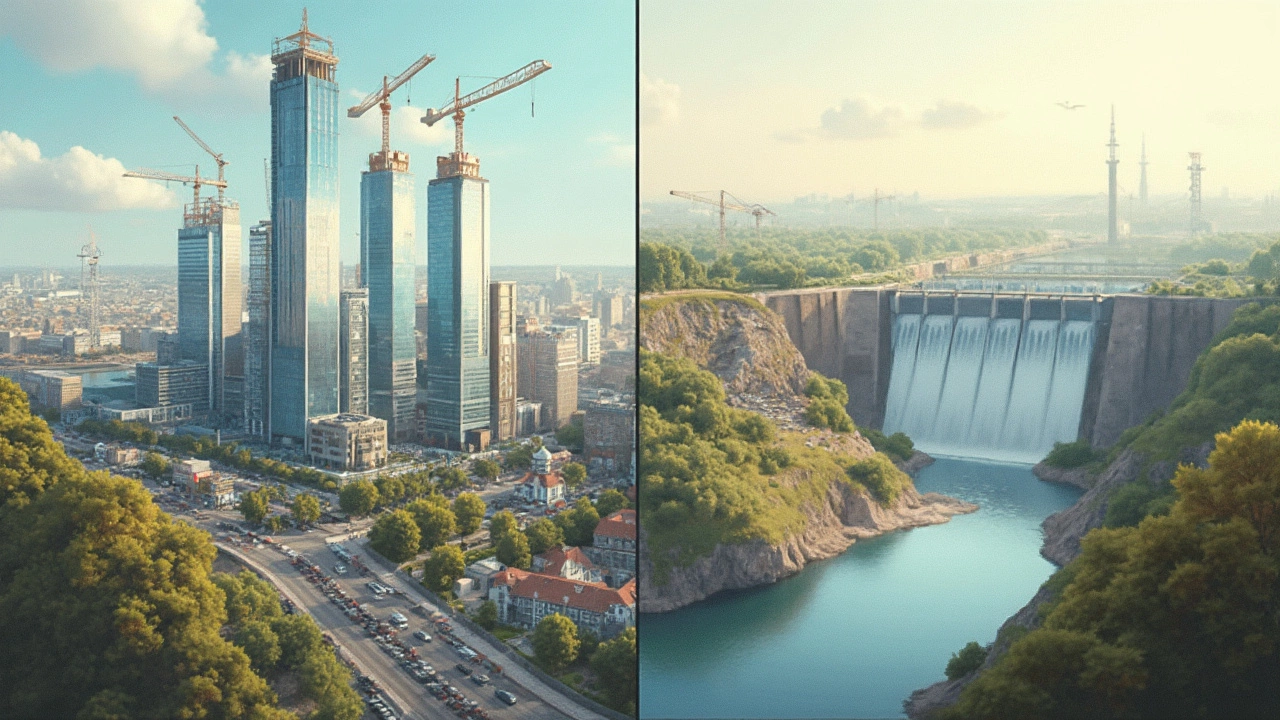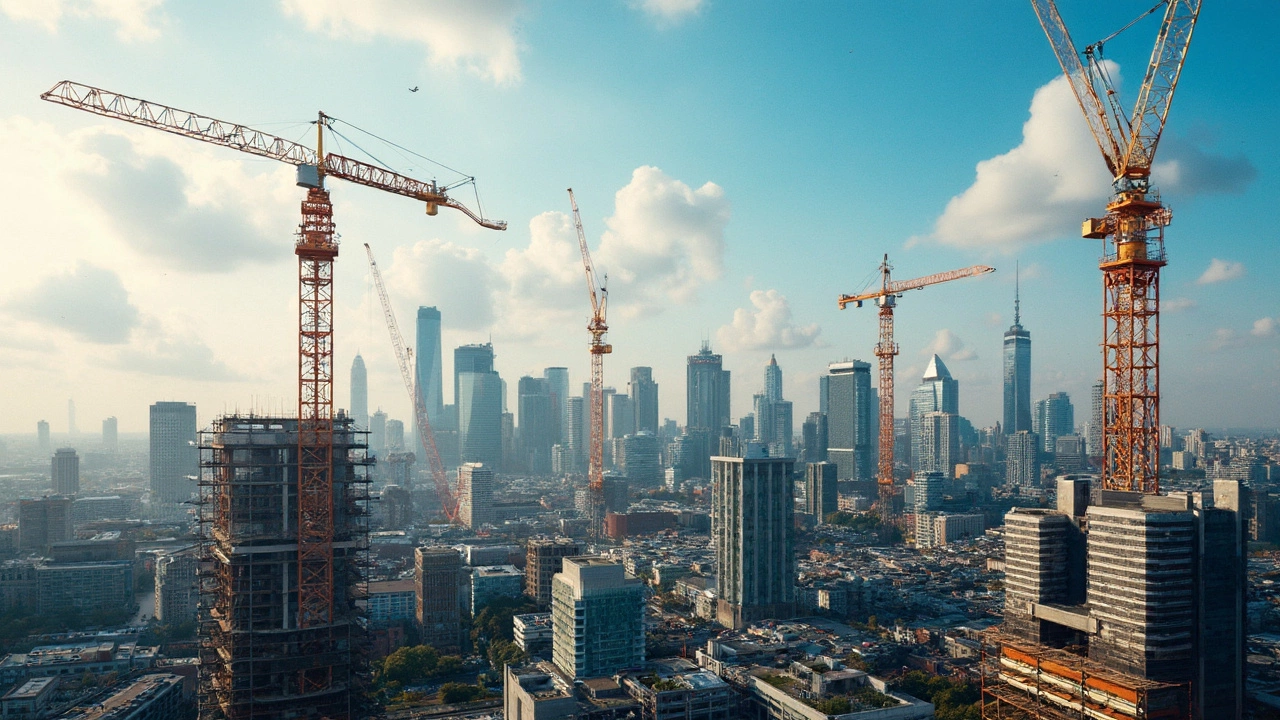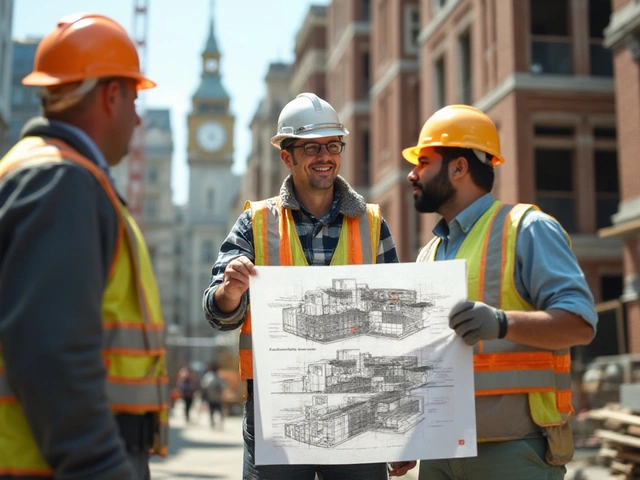So, you're curious about the differences between civil and commercial construction, huh? It might sound like a dry topic, but trust me; it's more fascinating than it seems. You've got two beasts in the construction world, each with its distinct identity and purpose. Understanding what sets them apart can make all the difference, whether you're planning a project or just trying to sound smart at your next dinner party.
Civil construction mainly deals with the infrastructure we use daily, like roads, bridges, and water supply systems. It's like building the backbone of cities and towns. On the flip side, commercial construction is all about creating spaces where businesses and services run, think of office buildings, shopping centers, and hotels.
Why does knowing the difference matter? Because both involve different regulations, timelines, and even challenges. Let's face it; constructing a highway has a whole different vibe compared to putting up a new office block. You're dealing with diverse teams, varying budgets, and sometimes, wild deadlines. It ain't all bricks and bulldozers!
- Overview of Civil Construction
- Understanding Commercial Construction
- Key Differences Between Civil and Commercial Projects
- Challenges in Civil vs Commercial Construction
- Choosing the Right Construction Type for Your Project
Overview of Civil Construction
Civil construction is all about creating the foundational stuff that keeps our society ticking. It focuses on infrastructure projects like roads, bridges, tunnels, and pretty much the vital structures that keep us connected and moving.
These projects aren't just for show. They're designed to improve public spaces and enhance how we live and work. Imagine the web of highways crisscrossing your state or the massive bridges linking our towns. That’s all thanks to civil construction. What's more, these projects often involve public funding and have to meet a bunch of regulations and standards.
Why all the fuss over these projects? Well, building a highway isn't just about laying down asphalt. You've got engineers designing massive drainage systems, teams ensuring environmental protection, and planners figuring out how traffic will flow for decades. Not to mention the army of folks keeping the budget and deadlines in check.
Here's an interesting tidbit: The USA invested billions in civil construction in the past decade, trying to modernize and repair aging infrastructure. This means thousands of jobs and a big impact on local economies. Fancy numbers? Check this out:
| Year | Investment (Billions $) |
|---|---|
| 2023 | 98 |
| 2024 | 105 |
| 2025 | 112 |
The magic of civil projects lies in their scale and complexity. Creating well-built highways and bridges is no small feat. It takes the collaboration of various sectors—from government agencies to private companies—to make these projects come to life.
Understanding Commercial Construction
Commercial construction is all about building structures for business purposes. Think of it as creating spaces where people shop, work, and enjoy their leisure time. These include office buildings, shopping centers, hotels, restaurants, and even hospitals. Unlike building a house, these projects need to handle a lot more foot traffic and operational demands.
One major thing to know about commercial construction is its focus on functionality and code compliance. These projects must meet strict safety standards, as they're often bustling with people. The buildings must adhere to various regulations concerning everything from fire safety to accessibility for folks with disabilities.
Another interesting point? The construction process often involves designing for future changes. Businesses grow, and their needs evolve, so these buildings need flexibility to allow for remodels or expansions.
Check out this little glimpse into the commercial construction timeline:
- Planning and Development: Before a shovel hits the dirt, there's tons of planning. This step involves finding the right location, figuring out what the market needs, and securing all necessary permits.
- Design Phase: Architects and engineers team up to draw the plans. They consider everything, from the structure's look to how it functions for its intended use.
- Pre-Construction: Here, everything's lined up, from materials to hiring contractors. Budgets get finalized, and schedules are drawn up.
- Construction: Finally, it’s time to build. This involves laying foundations, putting up walls, and making sure every part comes together just right.
- Post-Construction: Once the building's up, it gets a thorough inspection. After that, it's handed over to the client, ready to serve its purpose!
Commercial construction projects can have huge budgets and tight timelines. A single delay can turn into a costly setback. So, having a skilled project manager to keep everything running smoothly is key. That's why each step, from planning to the final walkthrough, is crucial and often involves a big team effort.
Whether you're eyeing a new local coffee shop or the construction of a massive shopping mall you pass by on your daily commute, knowing these details about commercial construction can give you a nifty behind-the-scenes peek!

Key Differences Between Civil and Commercial Projects
Alright, let's get down to the nitty-gritty of what really sets civil construction and commercial construction apart. On the surface, they might look similar—both involve lots of planning, materials, and sweat. But peek under the hood, and you'll find some key differences.
First off, the end goals are different. Civil construction is all about the essential infrastructure we rely on every day. Think highways, bridges, and dams. These projects typically involve large-scale public works funded by government entities. They aim to improve public utility and safety, and they often come with a hefty set of regulations.
Commercial construction, on the other hand, is focused on business and commerce. It's about creating spaces for economic activities like retail stores, office buildings, hotels, and even entertainment hubs. These projects are usually funded by private investors or corporations looking to attract customers and generate revenue. They deal with an entirely different set of priorities, like maximizing space and ensuring customer comfort.
Another biggie? The construction sites themselves. Civil projects might spread across miles, like with highways or bridges, while commercial projects typically concentrate on a specific plot of land. You can imagine the difference in project management! Managing a road stretching miles has different logistics compared to a towering hotel.
The timelines can vary too. Civil construction projects often take years due to their sheer scale and complexity. Ever seen a bridge project wrap up in six months? Exactly. Comparatively, commercial projects, while also complex, might have tighter deadlines to meet business needs. Time is money when it comes to commercial investment!
Here's a simple breakdown of these key differences:
- Project Purpose: Civil is infrastructure-focused; commercial is business-focused.
- Funding Sources: Civil projects are mainly public-funded; commercial projects are typically private-funded.
- Site Size: Civil projects can span vast areas; commercial projects focus on specific plots.
- Regulations: Civil constructions face stringent governmental regulations; commercial projects must meet business compliance standards.
Each type brings its own set of challenges, regulations, and objectives to the table. If you're dreaming about getting into construction or planning a project, knowing these differences will be your best friend!
Challenges in Civil vs Commercial Construction
Ever wonder why a road project seems to stretch into eternity while a new shopping mall pops up overnight? The challenges in civil construction vs commercial construction are no small fry. They each come with their obstacles, some predictable, others like a curveball right out of left field.
Starting with civil construction, imagine coordinating a project that spans miles. You're dealing with weather changes, fluctuating material costs, and, not to mention, the crazy paperwork for government approvals. Oh, yeah, and traffic nightmares. A rainstorm can delay roadwork for days, turning your carefully planned timeline into a guessing game.
Let's jump to the commercial side. You're often operating in a busy urban area, so space issues are a thing. Can someone say 'parking problems'? Balancing the disruption to local businesses while keeping construction on track is a regular headache. Plus, commercial buildings require precision - one misstep in installing those fancy glass facades can set things back.
A glimpse into stats shows where the bucks are spent. While labor costs stay relatively similar, civil projects tend to see a higher implication of budget on machinery while commercial projects might sink more into permits and interior materials.
| Construction Type | Main Budget Focus |
|---|---|
| Civil | Machinery, Infrastructure |
| Commercial | Permits, Interior Materials |
Timing is another toughie. Civil projects often hit snags due to regulatory issues; environmental laws must be respected to a tee. Commercial projects, meanwhile, battle strict deadlines judged on return on investment. Delay a mall opening, and you're messing with serious cash flow.
So, whether it's the weight of government protocols on the civil side or the tightrope of balancing aesthetics and functionality in commercial endeavors, each path has its unique hurdles. But hey, that's what makes the construction industry such a dynamic and ever-evolving field.

Choosing the Right Construction Type for Your Project
Okay, so you're ready to take the plunge into the construction world, but now comes the big question: do you go civil or commercial? Picking the right path isn't just a matter of flipping a coin; it's about figuring out what aligns best with your project goals, budget, and timeline.
First things first, ask yourself what the project is all about. If it's related to public infrastructure, like roads or water treatment plants, you're veering into civil construction territory. These projects are generally funded by government contracts and involve a lot of planning and compliance with strict regulations.
On the other hand, if you're dreaming about creating a shiny new office space or an elaborate shopping mall, then commercial construction is your game. These projects focus on spaces for retail, business, and hospitality, where private investments rule, and timelines are often tight to keep businesses running.
Now, let’s talk resources. Civil projects require specialized equipment and materials that are geared towards longevity and durability, given their role in public life. Commercial construction is typically more about aesthetics and customer experience, so you'll be thinking about things like interior design and functionality.
If you're still on the fence, consider hiring a consultant who knows the ins and outs of both domains. Armed with their insight, you'll get a clearer picture of what to expect, including potential costs and risks. And don’t forget the paperwork! Both types require different permits and compliance certificates, so staying organized will save you headaches down the road.
Ultimately, the key is aligning the project's objectives with the construction type that best suits your needs. Whether you’re breaking ground on a new highway or the next skyscraper, being informed will keep your project on track and your stress levels low.





